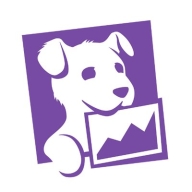

Datadog and Graylog Enterprise compete in the monitoring and log management category. Datadog seems to have the edge due to its ease of use and extensive integrations, providing a more comprehensive solution for businesses needing unified insights.
Features: Datadog's hosted model offers sharable dashboards, anomaly detection, and extensive integrations with cloud services like AWS for seamless monitoring and visualization. Its cloud-native setup also removes infrastructure burden, providing ease of use for non-technical users. Graylog Enterprise benefits from open-source roots with Elasticsearch, providing fast log retrieval, robust querying, and effective dashboarding and alerting features to bridge technical and non-technical teams.
Room for Improvement: Datadog could improve its on-premise upgrade processes and offer more customizable alerts and real-time usage insights, while also simplifying its dense UI and complex pricing structure. Graylog could enhance its alert systems, improve the user interface, and strengthen integration with container orchestration systems like Kubernetes to better serve high-throughput environments.
Ease of Deployment and Customer Service: Datadog is flexible, deployable across private and public clouds, supported by a vast ecosystem of integrations, though customer service can be inconsistent. Graylog's on-premise setup is familiar to Elasticsearch users and suits hybrid cloud environments, with customer support praised for responsiveness, despite occasional challenges with speed.
Pricing and ROI: Datadog faces critiques for price complexity with unexpected costs but offers significant ROI through operational efficiency for larger environments. Graylog, valued for its open-source model, provides minimal initial costs, appealing to budget-constrained users, although enterprise features may increase expenses through Elasticsearch.
| Product | Market Share (%) |
|---|---|
| Datadog | 4.5% |
| Graylog Enterprise | 4.4% |
| Other | 91.1% |

| Company Size | Count |
|---|---|
| Small Business | 80 |
| Midsize Enterprise | 46 |
| Large Enterprise | 99 |
| Company Size | Count |
|---|---|
| Small Business | 10 |
| Midsize Enterprise | 5 |
| Large Enterprise | 9 |
Datadog integrates extensive monitoring solutions with features like customizable dashboards and real-time alerting, supporting efficient system management. Its seamless integration capabilities with tools like AWS and Slack make it a critical part of cloud infrastructure monitoring.
Datadog offers centralized logging and monitoring, making troubleshooting fast and efficient. It facilitates performance tracking in cloud environments such as AWS and Azure, utilizing tools like EC2 and APM for service management. Custom metrics and alerts improve the ability to respond to issues swiftly, while real-time tools enhance system responsiveness. However, users express the need for improved query performance, a more intuitive UI, and increased integration capabilities. Concerns about the pricing model's complexity have led to calls for greater transparency and control, and additional advanced customization options are sought. Datadog's implementation requires attention to these aspects, with enhanced documentation and onboarding recommended to reduce the learning curve.
What are Datadog's Key Features?In industries like finance and technology, Datadog is implemented for its monitoring capabilities across cloud architectures. Its ability to aggregate logs and provide a unified view enhances reliability in environments demanding high performance. By leveraging real-time insights and integration with platforms like AWS and Azure, organizations in these sectors efficiently manage their cloud infrastructures, ensuring optimal performance and proactive issue resolution.
Graylog Enterprise, recognized for log collection, real-time search, and enriched data handling, offers an open-source framework that integrates seamlessly with Elasticsearch. Its user-centric interface streamlines data correlation and log aggregation, supporting both backend services and comprehensive monitoring needs.
Graylog Enterprise stands out for its stability and powerful log management capabilities, facilitating efficient log aggregation, real-time updates, and data analytics. Users benefit from its plugin-based alerting, user-friendly interface, and support for microservices, including Docker integration. The ability to search in detail, flexible API integration, and data enrichment features are highly valued. Challenges include collector application issues, desired visualization enhancements, and authentication integration improvements. Users seek advancements in UI customization, backup functions, and easier rule creation.
What are Graylog Enterprise's most important features?In industrial use, Graylog Enterprise is crucial for audit trailing in financial sectors, facilitating security event identification and error monitoring. Backend teams leverage real-time analytics for swift issue resolution, while developers appreciate the comprehensive log visualization enabled by Docker integration for microservice management.
We monitor all Log Management reviews to prevent fraudulent reviews and keep review quality high. We do not post reviews by company employees or direct competitors. We validate each review for authenticity via cross-reference with LinkedIn, and personal follow-up with the reviewer when necessary.